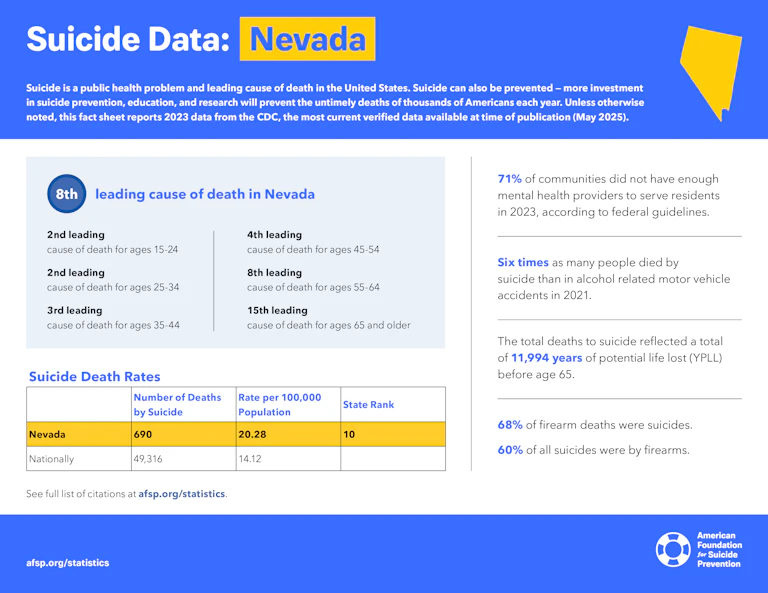Nevada

Nevada suicide prevention plans and initiatives
In 2003 Nevada law created the Statewide Program for Suicide Prevention and mandated it be led by a State Suicide Prevention Coordinator, who must also employ at least one person to act as a trainer for suicide prevention and networking facilitator (NRS § 439.511). The Program is now housed within the Office of Suicide Prevention (OSP), established in 2005 within the Department of Health and Human Services, Division of Public and Behavioral Health (DHHS/DPBH).
In 2013 Nevada law established the Committee to Review Suicide Fatalities (CRSF) within DHHS, and OSP worked to develop the protocols and tools to establish structure in that first year (NRS §§ 439.5102 to 5108). A 2016 report developed by the CRSF illuminated some of the specific issues and concerns for Nevada, and in order to move the report’s 12 recommendations forward, the Nevada Office of Suicide Prevention Action Plan 2017-2019 was created to guide future work and to serve as a communication tool with stakeholders.
Nevada laws
Key:
- Required by law
- Encouraged by law
- No law in place
Crisis lines and 988 implementation
- Addresses 988 infrastructure and provides for telecom user fee
- Addresses 988 infrastructure but does not include telecom user fee
- 988 law limited to creating an exploratory commission, advisory committee, or task force
Mental health parity
- Public health plans (e.g., Medicaid) regularly submit parity compliance analyses to state regulators
- Private health plans (individual and group) regularly submit parity compliance analyses to state regulators
K – 12 school suicide prevention
- Inclusion of the 988 Suicide & Crisis Lifeline and/or other crisis line(s) on student ID cards
- Student allowances for excused mental health absences
- School personnel must report student suicide risk to a parent and/or guardian
- Suicide prevention and/or mental health training for certain school personnel, annual
- Suicide prevention and/or mental health training for certain school personnel, not annual
- Suicide prevention, intervention, and postvention policies/programming
- Student education on suicide prevention
Health professional training in suicide assessment, treatment and management
- Mental health professionals receive regular training
- Mental health professionals receive one time training
- Medical/surgical professionals receive regular training
- Medical/surgical professionals receive one time training
Conversion therapy bans
- Prohibits licensed/board certified mental health providers from engaging in conversion therapy with minors under 18 years of age
- Prohibits licensed/board certified mental health providers from engaging in conversion therapy with vulnerable adults
- Prohibits use of state funds for any purpose related to conversion therapy (e.g., conducting, making a referral for, or extending health benefits coverage for)
University and college campus suicide prevention
- Inclusion of the 988 Suicide & Crisis Lifeline and/or other crisis line(s) on student ID cards
- Students receive information on available mental health and/or suicide prevention services and/or resources
- Adoption of suicide prevention/awareness policy or program
Firearms
- Process for extreme risk protection orders (ERPOs)
- State voluntary do not sell list